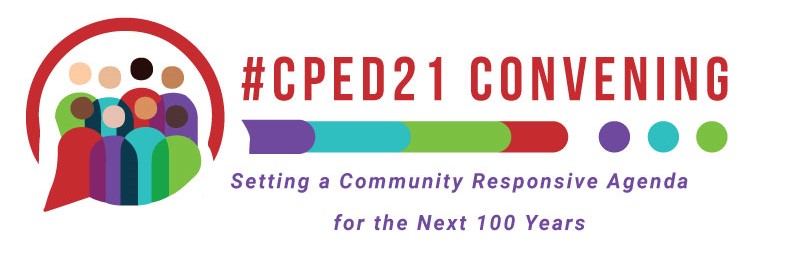#CPED21 Virtual Convening

Visit Convening Website
Table of Contents:
- Convening Theme
- Pre-Convening Workshops
- Agenda
Operationalizing the CPED Framework to prepare educational professionals who engage inquiry for and with communities and ensure all students learn and thrive in just and equitable systems.
With the passing of the 100th year anniversary of the creation of the education doctorate, we say goodbye to the decades of confusion that has surrounded the degree. As a CPED community, we claim the EdD as the professional practice doctorate in education and together seek to transform the advanced preparation and practice of educational professionals. Looking forward, we strive to establish the next 100 years of the EdD as the degree through which practitioners impact learning via collaboration with communities and the centering of equity and justice in educational outcomes.
The coalition of changemakers that comprise the CPED membership represents a community that is rich with interdependence that builds upon the shared vision of developing scholarly practitioners that are highly responsive to community needs in their own contexts of practice. The colleges and spaces of learning we all represent comprise communities of their own—that share culture and lived experiences instrumental in bringing faculty and students together to be responsive to their localized community contexts through the actionable research and outcomes that emerge from community-focused study agendas. Then there are the local community contexts that exist in and around educational institutions that can benefit from collaboration with, and shared power and influence for, the improvement of community conditions. So, community, and its many intertwined layers, means a great deal to us if we intend on carrying a spirit of community responsiveness into the next 100 years of EdD graduates.
As we step into this next phase, we wonder, How do we harness the power of the CPED community in conjunction with the research-focused community of our schools of education to improve the communities where our graduates work and lead? To answer this question, we ask CPED Community Members to interrogate their EdD programs and:
- Reflect on the CPED Framework, in particular the CPED principles, that suggest EdD programs:
Principle #1: “are framed around questions of equity, ethics, and social justice to bring about solutions to complex problems of practice.”
Principle #3: “provide opportunities for candidates to develop and demonstrate collaboration and communication skills to work with diverse communities and to build partnerships.”
- Examine how their laboratories of practice teach candidates to build partnerships and coalitions that engage and bring community members together, build capacity, and provide coordination support, to make present more underrepresented voices at decision-making tables.
- Contemplate how their EdD programs provide inquiry as practice that teaches community-engaged research, translational research, or applied research, and offers candidates the tools to collaborate with community stakeholders’ to gain an “intimate and necessary understanding of the assets, concerns, values, and activities of their constituents and communities” (Konkel, 2015).
- Evaluate how their program’s signature pedagogies and mentoring and advising structures teach candidates to look beyond their own view and elevate the voices of marginalized people in their inquiry and leadership work so that these groups can experience the benefits of research innovations and interventions (Yates et al, 2020)
- Demonstrate how their scholarly practitioner graduates are prepared for the ongoing impact and improvement of problems of practice through community collaboration.
- Consider the possibility of partnerships across communities for the improvement of the EdD program and the faculty and students that teach and learn in them.
Pre-Convening Workshops
Tuesday, October 19th
2:00pm - 4:00pm ET
Workshop A: How the Program of the Year (POY) Was Won: Will Your Program be the Next CPED Program of the Year?
Will your program be the next CPED program of the year? Learn the secrets of successful POY applications from recent winners and look ahead to POY 2022.
Join POY Co-Leads Kyle Ingle (University of Louisville) and Harriette Rasmussen (Drexel University) with POY award winners from the last three years: Deanna Hill of Drexel University (2019), Gage Jeter of the University of Florida (2020), and Jess Weiler, representing our most recent winner, Western Carolina University, 2021 POY. In this interactive workshop we will unpack the POY application process, learning how each of these POYs engaged their staff, interpreted the application form and rubric, and choices they made that – they believe – led to their success. We will consider the various ways in which our member institutions have understood the term “innovation” – which orients the award, expanding perhaps on that definition as we look to POY 2022. We will also address the most common challenge of POY applications, that of concrete evidence that backs up your claims to the committee.
We ask that participants come to this two-hour workshop with some initial ideas in mind that might orient an application; we will work in small groups to workshop your ideas, running a tuning protocol so that you will leave the session with collegial feedback on a future application. If you are not yet to that stage, join us anyway and participate in our conversation. You might discover that you are closer than you think!
Mentoring and Advising EdD Candidate Groups: Utilizing "Critical Friends" Protocols to Build Community and Co-Construct Knowledge:
Participants will review the CPED Design Concept of Mentoring and Advising and experiment with a group mentoring and advising model that utilizes a critical friends protocol to facilitate group dialogue
Presenters: Joy C. Phillips, Deanna Hill, Harriette Thurber Rasmussen, Nicole Y. Baird, Tynika Young-Aleibar, and Francis L. Cardozo from Drexel University.
Workshop Registration

 Prev Month
Prev Month View Month
View Month Search
Search Go to Month
Go to Month Next Month
Next Month
 Export Event
Export Event